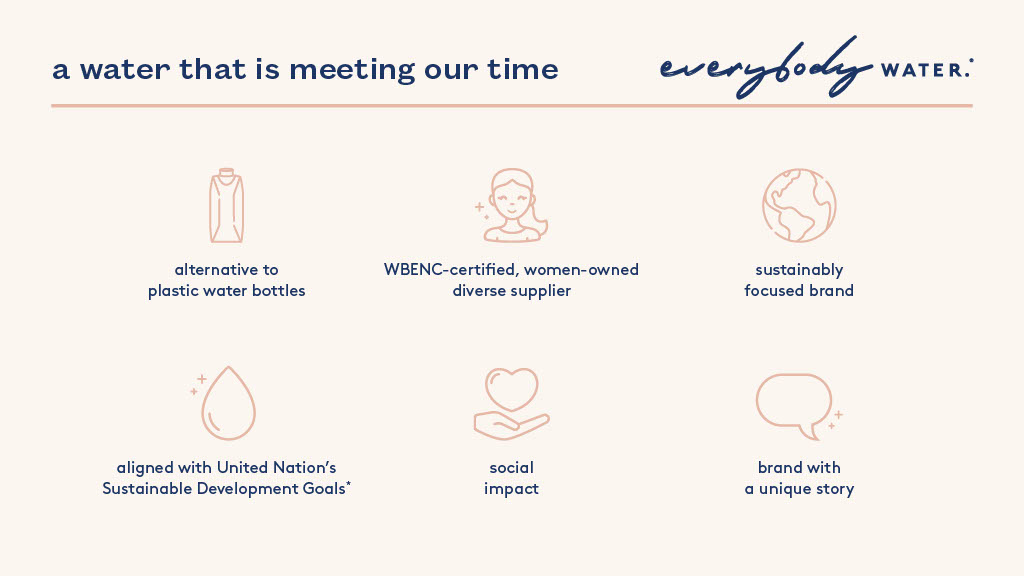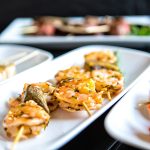
A Small Change for Catering with a Big Impact
Zingerman’s Catering & Events is always looking for ways to make more sustainable choices, which is why our catering team phased out all single-use plastic water bottles in the Spring of 2023. Catering is now exclusively using premium water in a carton—sourced, filtered, and packaged in nearby Saline, Michigan—from Everybody Water®, a women-owned, sustainably-minded business. Half of all the plastic bottled water sold at the Deli is through our catering department—we estimate that we’ll be replacing 10,000 plastic bottles with this switch! As Catering Director Nancy Eubanks adds,
In order to make sure our food arrives to its destination at its best quality and is event-ready, we, unfortunately, have to use materials like plastic wrap and disposable containers. We are looking for every opportunity to lessen the impact of our packaging and Everybody Water is a great change for us.
It’s a change we’re excited about for multiple reasons, and we think you will be, too.
Packaged with the Planet in Mind
Switching from plastic to paper sounds good right off the bat, especially when you consider that over 70 million households across the United States have access to carton recycling. But Everybody Water believes it’s not enough to say their product is recyclable.
They consider the entire product lifecycle, including how their plant-based cartons compare in the sourcing of raw materials, manufacturing processes, and transport requirements to that of aluminum cans and plastic bottles.
The Top 10 Reasons Why Boxed is Better
- Paper is a renewable material.
- The paper in their cartons’ paperboard is Forest Stewardship Council®-certified, meaning it comes from responsibly managed forests and other controlled sources.
- The unfilled paperboard is transported from the factory in paper rolls to the filling location which takes up much less space than unfilled round bottles, significantly reducing the number of trucks on the road and the associated CO2 emissions.
- The plant-based caps from Tetra Pak are made from sugarcane, another renewable material.
- Using renewable resources in their packaging preserves natural resources and lowers the carbon footprint. The trees and sugarcane used to make their cartons absorb CO2 and release oxygen, resulting in fewer greenhouse gases.
- The cartons are BPA-free and Non-PET.
- The water is sourced from a community system that flows directly into their filling facility (no hauling around water from one place to another).
- The cartons’ lightweight paper-based structure delivers high transport efficiency, saving fuel during transport.
- The shape of the cartons is also transport-efficient. When round bottles are packed for transport, there are gaps between them; these can lay flat against one another, making maximum use of the space. That means fewer trucks are needed to transport their cartons than round bottles.
- The packaging for transport is more sustainable—the cartons come in paper boxes, not shrink-wrapped in plastic as plastic bottles often are.

Local Water with a Global Impact
Co-founders Kimberly Reilly and Megan Hayes were inspired to shift their careers and create a company with a mission to help people have convenient access to clean water. Why? Because one-fifth of the world’s population lacks access to that fundamental need, and it’s a hardship that disproportionately affects women and girls. As Reilly and Hayes share:
Without running water in their homes, millions of women and girls are spending their time collecting water instead of attending school, earning incomes, and pursuing their dreams. When people have their most basic needs met, they can begin to thrive.
That goal led them to create a new brand of water—one that would not only offer an alternative to plastic water bottles but would also offer the opportunity to help bring infrastructure that provides running water, sinks, showers, and toilets into people’s homes. That last part about putting the infrastructure in homes is a key point, as they explain:
We’re particular about the projects we support… they are not all equal and not all can free women and girls from this work and time. The majority of clean water projects end with a village pump or well… but the work should not end there. Women and girls are still tasked with walking, carrying heavy water, and waiting in line all day. The projects we get behind bring running water directly into the home, giving families the same convenient access most of us have.
Everybody Water donates 3% of their annual gross revenue to support clean water and sanitation infrastructure projects that help protect water supplies from contamination, keep people healthy, and improve people’s lives. They’ve been exclusively working with Water1st International because their projects are sustainable and selectively chosen to be permanent solutions. They’re planned and built by people in the community who can maintain the systems over time, giving their projects a high long-term success rate. Oftentimes the projects also include purchasing land to protect watersheds for future generations.
One of their most recent clean water infrastructure projects was in San Simon, located in the Lempira region of Honduras. The community of San Simon had approximately 95 households living without running water or sanitation. Girls and women would walk for hours every day collecting unclean water. Families were constantly sick and spending the little money they have on medical bills for waterborne diseases. Everybody Water has helped change that forever. And now, by partnering with them, we’re all making a statement about the importance of clean water as a basic equality and helping to support more projects like the one in San Simon. It’s pretty amazing what a little carton of water can do.




